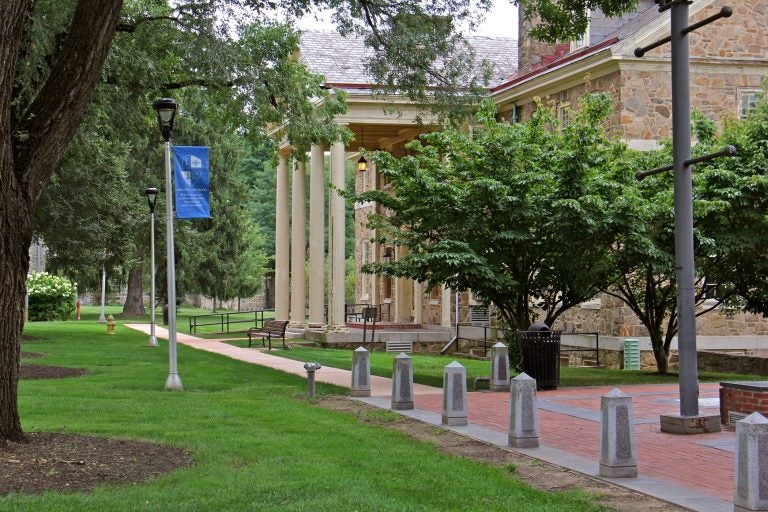Cheyney officials say budget will have surplus, accreditation status still unknown
Cheyney University is expected to take in $26 million in revenue this year with a $2.1 million surplus.

Browne Hall on the quad at Cheyney University. (Emma Lee/WHYY)
This article originally appeared on The Philadelphia Tribune.
—
Cheyney University officials said on Thursday — the same day they had to submit a major report that will be used to determine whether the school can keep its accreditation — that they had raised more than $4 million in donations and balanced the school’s budget for the first time in nearly a decade.
On top of that, Cheyney President Aaron Walton said in a statement on Thursday the school is expected to take in $26 million in revenue this year with a $2.1 million surplus.
Walton credited a new “expenditure reduction plan” for balancing its books, which included eliminating low-performing programs and staff positions, among other expenses. He said the changes “enhanced the integrity of the academic program” and the school’s resources were concentrated “in fewer, higher-performing and higher-demand programs.”
Walton did not provide detail about what cuts were made and did not return multiple requests for comment.
Robert Bogle, the president of The Philadelphia Tribune, is the chairman of the university’s council of trustees.
“We are well on our way to restoring Cheyney to its rightful position among elite Historically Black Colleges and Universities,” Bogle said in the released statement from the university.
Ken Mash, president of the Association of Pennsylvania State College and University Faculties that represents upwards of 30 faculty members at Cheyney, said he has been hearing “encouraging things” from the university about rising enrollment, alumni support and state funding increases.
Cheyney officials expect to receive $13.5 million in state funding — 2% more than in 2018-19 — in the 2019-20 school year.
But Mash, who has not seen the new budget figures, said the university has not shared enough information for the union to confidently determine whether the school will maintain its accreditation in the fall.
“Are we frustrated by the fact that we don’t have more information? Yes, we are,” he said. “Do we think we should have more information? Yes, we do.”
Accreditation on the line
On Thursday, Cheyney also faced a deadline to submit its “show cause report” to the Middle States Commission on Higher Education, the regional accrediting body.
The commission will use the report, along with documentation from an upcoming private site visit, to determine whether to allow the university to keep its accreditation. The commission will meet and make its decision on Nov. 21.
The report must document whether Cheyney can sustain compliance with the commission’s standards and policies, whether the school has balanced its budget for the upcoming school year, and how the school is balancing its books regarding $29.5 million in federal funding liability, among other things.
Brian Kirschner, a spokesman for the Middle States Commission, said earlier this week that he cannot comment about the report or even confirm if the commission eventually receives it on time.
Middle States put Cheyney on probation in 2015.
That year, Cheyney also landed on the U.S. Department of Education “Heightened Cash Monitoring 2” list over administrative oversight issues regarding $29.5 million in federal funds it received between 2011 and 2013. It has remained on the list each year since then.
A spokesman for the U.S. Department of Education declined to comment this week on Cheyney’s situation due to an ongoing investigation.
Middle States has given the university an extension of its accreditation to correct its finances.
There is no mechanism to extend the probation for a third year to Cheyney, which holds the lowest four-year graduation rate among the state’s 14-school system (7%).
If Cheyney loses its accreditation, the university cannot participate in federal aid programs, cutting off millions of dollars in federal funding. In the 2017-18 school year, 72% of first-time students received federal grants and 78% received federal loans aid, according to federal data.
If the commission strips Cheyney of its accreditation in November, it likely won’t happen immediately. The commission could extend the accreditation for a limited time as the university implements a “teach-out plan” to allow students to complete their education or transfer.
Cheyney also owes $43 million to Pennsylvania State System of Higher Education (PASSHE). However, if the school balances its budget this year and for two more years, PASSHE will forgive $30 million.
Daniel Greenstein, chancellor of the state system, which oversees Cheyney and the other 13 state-owned universities, previously said Cheyney would most likely lose its accreditation this year and fail to balance its budget. He pegged the university’s deficit at $10 million leading up to the June budget deadline.
Discrepancies in donations
Officials at Cheyney, the nation’s oldest Black university, have refused to provide a copy of the 2019-20 budget that was due to the state by June 30. In the university’s written response to a Right to Know request, Right to Know Officer Robin Coward said the records reflected “predecisional records” and were exempt from public disclosure.
The university will present its budget to the Pennsylvania State System of Higher Education in mid-October.
Leaders of the university and the Cheyney Foundation, the university’s fundraising nonprofit, said they raised more than $4.4 million from Jan. 1 to June 30 through their Resurgence campaign, however, documents obtained through a Right to Know request suggest received significantly less during that time frame.
Financial records listed individual gifts and monetary amounts given to the university in 2018 and 2019.
The financial records show gifts to the university totaled $740,000 in 2018. That same year, the foundation contributed $250,000 to the university, according to the document.
The financial records show the total gifts to Cheyney for the first six months of 2019 ticked only slightly above $425,000.
Another document — an email from Coward — listed three lump-sum donations the Cheyney Foundation made to the university between Jan. 1 and June 30. The lump sums listed in that email do not appear to be included in the financial records the university provided.
Irving Bailey, head of the Cheyney Foundation; Cynthia Ashford Moultrie, Cheyney’s executive director of finance and administration; and Coward did not respond to repeated requests seeking comment and clarification about the donation data.
In addition, the Cheyney Foundation’s tax filings on the Internal Revenue Services website show the foundation has raised less than $275,000 annually in recent years.
For tax year 2017, the most recent data available, the foundation raised $274,286 in revenue, which was reduced to negative $164,292 after expenses, according to the Form 990 tax filing. The nonprofit’s net assets that year were $730,816.
In tax year 2016, the foundation raised $122,714 in revenue which dropped to negative $69,122 after expenses, according to the nonprofit’s tax filing. The foundation’s net assets were listed at $963,686.
‘Up from here’
Cheyney student Blaine Louis-Thompson has been a victim of the state school’s cuts in recent years.
Louis-Thompson, 20, entered the Delaware County university in the fall of 2017, where he was on the football and track team. The next year, Cheyney cut those and other athletic programs as well as academic majors as it struggled financially.
As Louis-Thompson prepares to enter his senior year this fall, he says the vibe on campus has turned positive. He is confident the school will survive.
The school has become more academically focused and has reinvested in programs, opportunities and internships for students during the past year, said Louis-Thompson, the governor of Cheyney’s Student Government Association.
“When I look at Cheyney now, of course, we’ve had our troubles and disbeliefs before, but I definitely see Cheyney going up from here,” said Louis-Thompson, who is also president of the school’s Phi Beta Sigma chapter.
“At this point,” Louis-Thompson said, “we’re doing so well, I don’t think it’s an issue at all.”
WHYY is your source for fact-based, in-depth journalism and information. As a nonprofit organization, we rely on financial support from readers like you. Please give today.




